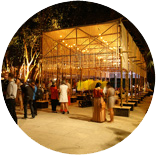Theme
The theme for the BMW Guggenheim Lab was Confronting Comfort. In New York, Berlin, and Mumbai, the Lab explored how urban environments can be made more responsive to people’s needs, how people can feel more at ease in urban environments, and how to find a balance between notions of modern comfort and the urgent need for environmental and social responsibility.
We live in a highly globalized and urbanized world. Yet complex urban landscapes that are increasingly intertwined through transnational and informational networks continue to be based on rigid systems of urban planning, architecture, and infrastructure. These systems have fostered an expanding homogeneity that puts at risk the relationship of our cities and urban areas with the specific conditions of their immediate context and their own past. More importantly, it puts at risk our relationship, as citizens and individuals, with the urban environment, affecting our sense of ownership and awareness of the space around us, and our sense that we should be able to change and improve it.
As a result, we have constructed relentless systems of consumerist comfort that alleviate the monotony of these static landscapes by blocking interaction with our surroundings. The comfort we derive from these solutions—which range from communication commodities to fancy gadgets, to privacy and security devices, to comfort food and other ways to appease our bodies—diverts the mind from the repetitive processes of everyday life in cities that at times we feel we have no possibility of changing.
Maximizing comfort has not only allowed us to cope with sometimes grueling urban conditions, but it has also become a measure of individual wealth, success, and status. Unfortunately, our irrepressible human aspiration to find ease often leads us in unsustainable directions. How can we find a balance between notions of modern comfort and the urgent need for environmentally responsible solutions that empower us as social individuals? If we were to achieve such balance through creative solutions, how would our understanding of comfort change? How would we respond to the newfound ease attained through responsible means?
The potential for new systems of urban living raises a variety of questions, among them: Can architecture and adequate urban infrastructures promote, enhance, and develop personal and collective growth at a physical and intellectual level, specifically by encouraging involvement with urban systems? And how can comfort be customized geographically, without the imposition of homogenous systems throughout the globe? What would responsible comfort mean in zones with different economic, social, and environmental conditions?

